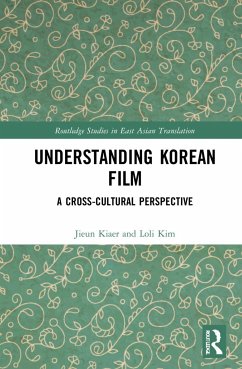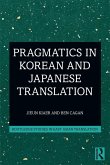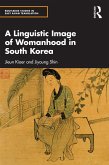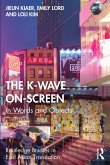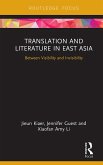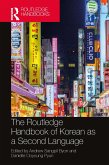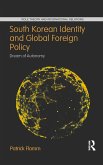- Broschiertes Buch
- Merkliste
- Auf die Merkliste
- Bewerten Bewerten
- Teilen
- Produkt teilen
- Produkterinnerung
- Produkterinnerung
Film viewing presents a unique situation in which the film viewer is unwittingly placed in the role of a multimodal translator, finding themselves entirely responsible for interpreting multifaceted meanings at the mercy of their own semiotic repertoire. Yet, researchers have made little attempt, as they have for literary texts, to explain the gap in translation when it comes to multimodality. It is no wonder then that, in an era of informed consumerism, film viewers have been trying to develop their own toolboxes for the tasks that they are faced with when viewing foreign language films by…mehr
Andere Kunden interessierten sich auch für
![Pragmatics in Korean and Japanese Translation Pragmatics in Korean and Japanese Translation]() Jieun KiaerPragmatics in Korean and Japanese Translation41,99 €
Jieun KiaerPragmatics in Korean and Japanese Translation41,99 €![A Linguistic Image of Womanhood in South Korea A Linguistic Image of Womanhood in South Korea]() Jieun KiaerA Linguistic Image of Womanhood in South Korea40,99 €
Jieun KiaerA Linguistic Image of Womanhood in South Korea40,99 €![The K-Wave On-Screen The K-Wave On-Screen]() Jieun KiaerThe K-Wave On-Screen43,99 €
Jieun KiaerThe K-Wave On-Screen43,99 €![Translation and Literature in East Asia Translation and Literature in East Asia]() Jieun KiaerTranslation and Literature in East Asia25,99 €
Jieun KiaerTranslation and Literature in East Asia25,99 €![The Routledge Handbook of Korean as a Second Language The Routledge Handbook of Korean as a Second Language]() The Routledge Handbook of Korean as a Second Language235,99 €
The Routledge Handbook of Korean as a Second Language235,99 €![South Korean Identity and Global Foreign Policy South Korean Identity and Global Foreign Policy]() Patrick FlammSouth Korean Identity and Global Foreign Policy44,99 €
Patrick FlammSouth Korean Identity and Global Foreign Policy44,99 €![Korean Wave in World Englishes Korean Wave in World Englishes]() Brittany Khedun-BurgoineKorean Wave in World Englishes46,99 €
Brittany Khedun-BurgoineKorean Wave in World Englishes46,99 €-
-
-
Film viewing presents a unique situation in which the film viewer is unwittingly placed in the role of a multimodal translator, finding themselves entirely responsible for interpreting multifaceted meanings at the mercy of their own semiotic repertoire. Yet, researchers have made little attempt, as they have for literary texts, to explain the gap in translation when it comes to multimodality. It is no wonder then that, in an era of informed consumerism, film viewers have been trying to develop their own toolboxes for the tasks that they are faced with when viewing foreign language films by sharing information online. This is particularly the case with South Korean film, which has drawn the interest of foreign viewers who want to understand these untranslatable meanings and even go as far as learning the Korean language to do so.
Understanding Korean Film: A Cross-Cultural Perspective breaks this long-awaited ground by explaining the meaning potential of a selection of common Korean verbal and non-verbal expressions in a range of contexts in South Korean film that are often untranslatable for English-speaking Western viewers. Through the selection of expressions provided in the text, readers become familiar with a system that can be extended more generally to understanding expressions in South Korean films. Formal analyses are presented in the form of in-depth discursive deconstructions of verbal and non-verbal expressions within the context of South Korea's Confucian traditions. Our case studies thus illustrate, in a more systematic way, how various meaning potentials can be inferred in particular narrative contexts.
Understanding Korean Film: A Cross-Cultural Perspective breaks this long-awaited ground by explaining the meaning potential of a selection of common Korean verbal and non-verbal expressions in a range of contexts in South Korean film that are often untranslatable for English-speaking Western viewers. Through the selection of expressions provided in the text, readers become familiar with a system that can be extended more generally to understanding expressions in South Korean films. Formal analyses are presented in the form of in-depth discursive deconstructions of verbal and non-verbal expressions within the context of South Korea's Confucian traditions. Our case studies thus illustrate, in a more systematic way, how various meaning potentials can be inferred in particular narrative contexts.
Produktdetails
- Produktdetails
- Routledge Studies in East Asian Translation
- Verlag: Routledge / Taylor & Francis
- Seitenzahl: 272
- Erscheinungstermin: 31. Mai 2023
- Englisch
- Abmessung: 234mm x 156mm x 15mm
- Gewicht: 453g
- ISBN-13: 9780367546212
- ISBN-10: 0367546213
- Artikelnr.: 67822755
- Herstellerkennzeichnung
- Libri GmbH
- Europaallee 1
- 36244 Bad Hersfeld
- gpsr@libri.de
- Routledge Studies in East Asian Translation
- Verlag: Routledge / Taylor & Francis
- Seitenzahl: 272
- Erscheinungstermin: 31. Mai 2023
- Englisch
- Abmessung: 234mm x 156mm x 15mm
- Gewicht: 453g
- ISBN-13: 9780367546212
- ISBN-10: 0367546213
- Artikelnr.: 67822755
- Herstellerkennzeichnung
- Libri GmbH
- Europaallee 1
- 36244 Bad Hersfeld
- gpsr@libri.de
Jieun Kiaer is professor of Korean Language and Linguistics at the University of Oxford. She publishes widely on East Asian translation, with particular emphasis on Korean translation. Her publications include The Routledge Course in Korean Translation (2018) and Korean Literature through the Korean Wave (with Anna Yates-Lu, 2019). Kiaer is also the series editor for Routledge Studies in East Asian Translation. Loli Kim is a DPhil researcher in Korean Studies at the University of Oxford. Her work explores multimodal, semantic, and cross-cultural communication, particularly from a Korean perspective. Her current research focuses on the translation of multimodal meaning-making processes in South Korean film that become 'untranslatable' for Anglophone European viewers, with special focus on socio-pragmatic verbal and non-verbal behavioural expressions.
Table of Contents
LIST OF FIGURES
LIST OF TABLES
ACKNOWLEDGEMENTS
PRELIMINARIES
1. INTRODUCTION
1.1 THE GLOBAL AGE OF KOREAN FILM
1.2. THE ONE-INCH BARRIER
1.3. FILM VIEWERS SEEK VISIBILITY
1.4. THE IMPORTANCE OF UNDERSTANDING KOREAN INTERACTIONS
1.5. WHAT YOU WILL FIND IN THIS BOOK
2. THEORETICAL BACKGROUND
2.1. CALLS FOR VISIBILITY
2.1.1. Calls for Visibility in National Film Studies
2.1.2. Current K-Film Literature
2.1.3. Defining Foreign
2.1.4. Invisibility in Translation and Foreignisation
2.1.5. Cultural Translation
2.1.6. The Implications of (In)visibles
2.1.7. Cultural Appropriation and The Problems with Anglicisation
2.2. KOREAN COMMUNICATION: A BIRD'S EYE VIEW
2.2.1. Interactional Dynamics: A Socio-Pragmatically Rich Language
2.2.2. Distance matters: Respect vs. Intimacy
2.2.3. Speech Styles
2.2.4. Negotiating Respect and Intimacy: How to Modulate Expressions
2.2.5. The Importance of Non-Verbal Communication
2.2.6. How This Culminates in Multimodal Invisibility in K-Film
2.2.7. Summary: Socio-Pragmatic Invisibles in K-film Translation
3. THE KOREAN CULTURAL CONTEXT
3.1. FIVE RELATIONS: THE FUNDAMENT OF NEO-CONFUCIANISM
3.1.1. Parents and children
3.1.2. King and subjects
3.1.3. Husband and Wife
3.1.4. Age
3.1.5. Siblings
3.1.6. Womanhood
3.2. CONTEMPORARY CONFUCIAN CONTEXT
3.2.1. Oryun in Contemporary Korea
3.3. ADDITIONAL CONCEPTS TO FAMILIARISE YOURSELF WITH
3.3.1. Han ( )
3.3.2. Jeong ( )
3.3.3. Ansim ( )
3.3.4. Nunchi ( )
3.3.5. Chemyeon ( )
4. SOCIO-PRAGMATIC STRATEGIES IN K-FILM
4.1. HOW TO ADDRESS PEOPLE: ADDRESS TERMS AND SECOND PERSON PRONOUNS
4.2. NON-VERBAL HONORIFICS
4.3. MULTIMODAL MODULATION HYPOTHESIS
4.4. HOW DO WE DEFINE A 'SOCIO-PRAGMATIC PRIMITIVE'?
4.4.1. Social Factors
4.4.2. Classifying the Politeness of Expressions
4.5. SOCIO-PRAGMATIC PRIMITIVES IN MORE CONCRETE TERMS
4.5.1. Abbreviations and logical operators
4.5.2. Reading conditional and defeasible logic
4.6. A SOCIO-PRAGMATIC TOOLBOX FOR INTERPRETING K-FILM
4.6.1. Non-Verbal Socio-Pragmatic Primitives
4.6.2. Verbal Socio-Pragmatic Primitives
4.6.3. Summary: Using socio-pragmatic primitives for film analysis and casual film viewing
5. CASE STUDIES
5.1. SADO
5.1.1. Context
5.1.2. Case Study 1: How to Irritate Your Neo-Confucian Father
5.1.3. Case Study 2: The Girl Doesn't Know Her Place
5.2. GISAENGCHUNG
5.2.1. Context
5.2.2. Case Study 3: Why Did Mr. Kim Kill Mr. Park?
5.3. 82 NYEONSAENG KIM JI-YOUNG
5.3.1. Context
5.3.2. Case Study 4: What Happened to Ji-young at Chuseok?
5.4. TAEKSI UNJEONSA
5.4.1. Context
5.4.2. Case Study 5: He isn't just having a hard time, he's lost all hope.
5.4.3. Case Study 6: They're good friends, it's not just humorous
5.4.4. Case Study 7: He's not just saying sorry, he genuinely feels guilty
5.4.5. Case Study 8: Skinship and the development of Sa-bok and Jürgen's bond
5.5. CHINGU
5.5.1. Case Study 9: "You Wanna Die?"
5.5.2. Case Study 10: Frenemies
5.6. JOPOK MANURA
5.6.1. Case Study 11: Who does Eun-jin respect?
5.6.2. Case Study 12: How 'Not' to Meet Your Korean In-Laws
5.6.3. Case Study 13: 101 on Being a Woman: Uhhh Oppa!
5.6.4. Case Study 14: From Gangster to Wife
5.7. HANYEO
5.7.1. Case Study 15: He's Losing His Temper
5.7.2. Case Study 16: Don't Call Me Crazy!
5.7.3. Case Study 17: The Gohs' Insincerity
5.7.4. Case Study 18: The Housekeeper's Apology
5.8. AI KAEN SEUPIKEU
5.8.1. Case Study 19: Stimulating Empathy, Korean Style!
5.8.2. Case Study 20: Creating Poignancy in Language Use
5.8.3. Case Study 21: Defining Bad
5.8.4. Case Study 22: Chief Park? Forget it, I'll call you Min-Jae!
6. CONCLUSION
6.1. BEYOND THE SUBTITLE
6.2. THE TERMS FOR UNDERSTANDING K-FILM
6.3. FILM RESEARCHERS AS TRANSLATORS
6.4. THE FUTURE OF THIS RESEARCH
BASIC MULTIMODAL GLOSSARY FOR K-FILM VIEWING
APPENDIX
REFERENCES
FILMOGRAPHY
INDEX
LIST OF FIGURES
LIST OF TABLES
ACKNOWLEDGEMENTS
PRELIMINARIES
1. INTRODUCTION
1.1 THE GLOBAL AGE OF KOREAN FILM
1.2. THE ONE-INCH BARRIER
1.3. FILM VIEWERS SEEK VISIBILITY
1.4. THE IMPORTANCE OF UNDERSTANDING KOREAN INTERACTIONS
1.5. WHAT YOU WILL FIND IN THIS BOOK
2. THEORETICAL BACKGROUND
2.1. CALLS FOR VISIBILITY
2.1.1. Calls for Visibility in National Film Studies
2.1.2. Current K-Film Literature
2.1.3. Defining Foreign
2.1.4. Invisibility in Translation and Foreignisation
2.1.5. Cultural Translation
2.1.6. The Implications of (In)visibles
2.1.7. Cultural Appropriation and The Problems with Anglicisation
2.2. KOREAN COMMUNICATION: A BIRD'S EYE VIEW
2.2.1. Interactional Dynamics: A Socio-Pragmatically Rich Language
2.2.2. Distance matters: Respect vs. Intimacy
2.2.3. Speech Styles
2.2.4. Negotiating Respect and Intimacy: How to Modulate Expressions
2.2.5. The Importance of Non-Verbal Communication
2.2.6. How This Culminates in Multimodal Invisibility in K-Film
2.2.7. Summary: Socio-Pragmatic Invisibles in K-film Translation
3. THE KOREAN CULTURAL CONTEXT
3.1. FIVE RELATIONS: THE FUNDAMENT OF NEO-CONFUCIANISM
3.1.1. Parents and children
3.1.2. King and subjects
3.1.3. Husband and Wife
3.1.4. Age
3.1.5. Siblings
3.1.6. Womanhood
3.2. CONTEMPORARY CONFUCIAN CONTEXT
3.2.1. Oryun in Contemporary Korea
3.3. ADDITIONAL CONCEPTS TO FAMILIARISE YOURSELF WITH
3.3.1. Han ( )
3.3.2. Jeong ( )
3.3.3. Ansim ( )
3.3.4. Nunchi ( )
3.3.5. Chemyeon ( )
4. SOCIO-PRAGMATIC STRATEGIES IN K-FILM
4.1. HOW TO ADDRESS PEOPLE: ADDRESS TERMS AND SECOND PERSON PRONOUNS
4.2. NON-VERBAL HONORIFICS
4.3. MULTIMODAL MODULATION HYPOTHESIS
4.4. HOW DO WE DEFINE A 'SOCIO-PRAGMATIC PRIMITIVE'?
4.4.1. Social Factors
4.4.2. Classifying the Politeness of Expressions
4.5. SOCIO-PRAGMATIC PRIMITIVES IN MORE CONCRETE TERMS
4.5.1. Abbreviations and logical operators
4.5.2. Reading conditional and defeasible logic
4.6. A SOCIO-PRAGMATIC TOOLBOX FOR INTERPRETING K-FILM
4.6.1. Non-Verbal Socio-Pragmatic Primitives
4.6.2. Verbal Socio-Pragmatic Primitives
4.6.3. Summary: Using socio-pragmatic primitives for film analysis and casual film viewing
5. CASE STUDIES
5.1. SADO
5.1.1. Context
5.1.2. Case Study 1: How to Irritate Your Neo-Confucian Father
5.1.3. Case Study 2: The Girl Doesn't Know Her Place
5.2. GISAENGCHUNG
5.2.1. Context
5.2.2. Case Study 3: Why Did Mr. Kim Kill Mr. Park?
5.3. 82 NYEONSAENG KIM JI-YOUNG
5.3.1. Context
5.3.2. Case Study 4: What Happened to Ji-young at Chuseok?
5.4. TAEKSI UNJEONSA
5.4.1. Context
5.4.2. Case Study 5: He isn't just having a hard time, he's lost all hope.
5.4.3. Case Study 6: They're good friends, it's not just humorous
5.4.4. Case Study 7: He's not just saying sorry, he genuinely feels guilty
5.4.5. Case Study 8: Skinship and the development of Sa-bok and Jürgen's bond
5.5. CHINGU
5.5.1. Case Study 9: "You Wanna Die?"
5.5.2. Case Study 10: Frenemies
5.6. JOPOK MANURA
5.6.1. Case Study 11: Who does Eun-jin respect?
5.6.2. Case Study 12: How 'Not' to Meet Your Korean In-Laws
5.6.3. Case Study 13: 101 on Being a Woman: Uhhh Oppa!
5.6.4. Case Study 14: From Gangster to Wife
5.7. HANYEO
5.7.1. Case Study 15: He's Losing His Temper
5.7.2. Case Study 16: Don't Call Me Crazy!
5.7.3. Case Study 17: The Gohs' Insincerity
5.7.4. Case Study 18: The Housekeeper's Apology
5.8. AI KAEN SEUPIKEU
5.8.1. Case Study 19: Stimulating Empathy, Korean Style!
5.8.2. Case Study 20: Creating Poignancy in Language Use
5.8.3. Case Study 21: Defining Bad
5.8.4. Case Study 22: Chief Park? Forget it, I'll call you Min-Jae!
6. CONCLUSION
6.1. BEYOND THE SUBTITLE
6.2. THE TERMS FOR UNDERSTANDING K-FILM
6.3. FILM RESEARCHERS AS TRANSLATORS
6.4. THE FUTURE OF THIS RESEARCH
BASIC MULTIMODAL GLOSSARY FOR K-FILM VIEWING
APPENDIX
REFERENCES
FILMOGRAPHY
INDEX
Table of Contents LIST OF FIGURES LIST OF TABLES ACKNOWLEDGEMENTS PRELIMINARIES 1. INTRODUCTION 1.1 THE GLOBAL AGE OF KOREAN FILM 1.2. THE ONE-INCH BARRIER 1.3. FILM VIEWERS SEEK VISIBILITY 1.4. THE IMPORTANCE OF UNDERSTANDING KOREAN INTERACTIONS 1.5. WHAT YOU WILL FIND IN THIS BOOK 2. THEORETICAL BACKGROUND 2.1. CALLS FOR VISIBILITY 2.1.1. Calls for Visibility in National Film Studies 2.1.2. Current K-Film Literature 2.1.3. Defining Foreign 2.1.4. Invisibility in Translation and Foreignisation 2.1.5. Cultural Translation 2.1.6. The Implications of (In)visibles 2.1.7. Cultural Appropriation and The Problems with Anglicisation 2.2. KOREAN COMMUNICATION: A BIRD'S EYE VIEW 2.2.1. Interactional Dynamics: A Socio-Pragmatically Rich Language 2.2.2. Distance matters: Respect vs. Intimacy 2.2.3. Speech Styles 2.2.4. Negotiating Respect and Intimacy: How to Modulate Expressions 2.2.5. The Importance of Non-Verbal Communication 2.2.6. How This Culminates in Multimodal Invisibility in K-Film 2.2.7. Summary: Socio-Pragmatic Invisibles in K-film Translation 3. THE KOREAN CULTURAL CONTEXT 3.1. FIVE RELATIONS: THE FUNDAMENT OF NEO-CONFUCIANISM 3.1.1. Parents and children 3.1.2. King and subjects 3.1.3. Husband and Wife 3.1.4. Age 3.1.5. Siblings 3.1.6. Womanhood 3.2. CONTEMPORARY CONFUCIAN CONTEXT 3.2.1. Oryun in Contemporary Korea 3.3. ADDITIONAL CONCEPTS TO FAMILIARISE YOURSELF WITH 3.3.1. Han (
) 3.3.2. Jeong (
) 3.3.3. Ansim (
) 3.3.4. Nunchi (
) 3.3.5. Chemyeon (
) 4. SOCIO-PRAGMATIC STRATEGIES IN K-FILM 4.1. HOW TO ADDRESS PEOPLE: ADDRESS TERMS AND SECOND PERSON PRONOUNS 4.2. NON-VERBAL HONORIFICS 4.3. MULTIMODAL MODULATION HYPOTHESIS 4.4. HOW DO WE DEFINE A 'SOCIO-PRAGMATIC PRIMITIVE'? 4.4.1. Social Factors 4.4.2. Classifying the Politeness of Expressions 4.5. SOCIO-PRAGMATIC PRIMITIVES IN MORE CONCRETE TERMS 4.5.1. Abbreviations and logical operators 4.5.2. Reading conditional and defeasible logic 4.6. A SOCIO-PRAGMATIC TOOLBOX FOR INTERPRETING K-FILM 4.6.1. Non-Verbal Socio-Pragmatic Primitives 4.6.2. Verbal Socio-Pragmatic Primitives 4.6.3. Summary: Using socio-pragmatic primitives for film analysis and casual film viewing 5. CASE STUDIES 5.1. SADO 5.1.1. Context 5.1.2. Case Study 1: How to Irritate Your Neo-Confucian Father 5.1.3. Case Study 2: The Girl Doesn't Know Her Place 5.2. GISAENGCHUNG 5.2.1. Context 5.2.2. Case Study 3: Why Did Mr. Kim Kill Mr. Park? 5.3. 82 NYEONSAENG KIM JI-YOUNG 5.3.1. Context 5.3.2. Case Study 4: What Happened to Ji-young at Chuseok? 5.4. TAEKSI UNJEONSA 5.4.1. Context 5.4.2. Case Study 5: He isn't just having a hard time, he's lost all hope. 5.4.3. Case Study 6: They're good friends, it's not just humorous 5.4.4. Case Study 7: He's not just saying sorry, he genuinely feels guilty 5.4.5. Case Study 8: Skinship and the development of Sa-bok and Jürgen's bond 5.5. CHINGU 5.5.1. Case Study 9: "You Wanna Die?" 5.5.2. Case Study 10: Frenemies 5.6. JOPOK MANURA 5.6.1. Case Study 11: Who does Eun-jin respect? 5.6.2. Case Study 12: How 'Not' to Meet Your Korean In-Laws 5.6.3. Case Study 13: 101 on Being a Woman: Uhhh Oppa! 5.6.4. Case Study 14: From Gangster to Wife 5.7. HANYEO 5.7.1. Case Study 15: He's Losing His Temper 5.7.2. Case Study 16: Don't Call Me Crazy! 5.7.3. Case Study 17: The Gohs' Insincerity 5.7.4. Case Study 18: The Housekeeper's Apology 5.8. AI KAEN SEUPIKEU 5.8.1. Case Study 19: Stimulating Empathy, Korean Style! 5.8.2. Case Study 20: Creating Poignancy in Language Use 5.8.3. Case Study 21: Defining Bad 5.8.4. Case Study 22: Chief Park? Forget it, I'll call you Min-Jae! 6. CONCLUSION 6.1. BEYOND THE SUBTITLE 6.2. THE TERMS FOR UNDERSTANDING K-FILM 6.3. FILM RESEARCHERS AS TRANSLATORS 6.4. THE FUTURE OF THIS RESEARCH BASIC MULTIMODAL GLOSSARY FOR K-FILM VIEWING APPENDIX REFERENCES FILMOGRAPHY INDEX
) 3.3.2. Jeong (
) 3.3.3. Ansim (
) 3.3.4. Nunchi (
) 3.3.5. Chemyeon (
) 4. SOCIO-PRAGMATIC STRATEGIES IN K-FILM 4.1. HOW TO ADDRESS PEOPLE: ADDRESS TERMS AND SECOND PERSON PRONOUNS 4.2. NON-VERBAL HONORIFICS 4.3. MULTIMODAL MODULATION HYPOTHESIS 4.4. HOW DO WE DEFINE A 'SOCIO-PRAGMATIC PRIMITIVE'? 4.4.1. Social Factors 4.4.2. Classifying the Politeness of Expressions 4.5. SOCIO-PRAGMATIC PRIMITIVES IN MORE CONCRETE TERMS 4.5.1. Abbreviations and logical operators 4.5.2. Reading conditional and defeasible logic 4.6. A SOCIO-PRAGMATIC TOOLBOX FOR INTERPRETING K-FILM 4.6.1. Non-Verbal Socio-Pragmatic Primitives 4.6.2. Verbal Socio-Pragmatic Primitives 4.6.3. Summary: Using socio-pragmatic primitives for film analysis and casual film viewing 5. CASE STUDIES 5.1. SADO 5.1.1. Context 5.1.2. Case Study 1: How to Irritate Your Neo-Confucian Father 5.1.3. Case Study 2: The Girl Doesn't Know Her Place 5.2. GISAENGCHUNG 5.2.1. Context 5.2.2. Case Study 3: Why Did Mr. Kim Kill Mr. Park? 5.3. 82 NYEONSAENG KIM JI-YOUNG 5.3.1. Context 5.3.2. Case Study 4: What Happened to Ji-young at Chuseok? 5.4. TAEKSI UNJEONSA 5.4.1. Context 5.4.2. Case Study 5: He isn't just having a hard time, he's lost all hope. 5.4.3. Case Study 6: They're good friends, it's not just humorous 5.4.4. Case Study 7: He's not just saying sorry, he genuinely feels guilty 5.4.5. Case Study 8: Skinship and the development of Sa-bok and Jürgen's bond 5.5. CHINGU 5.5.1. Case Study 9: "You Wanna Die?" 5.5.2. Case Study 10: Frenemies 5.6. JOPOK MANURA 5.6.1. Case Study 11: Who does Eun-jin respect? 5.6.2. Case Study 12: How 'Not' to Meet Your Korean In-Laws 5.6.3. Case Study 13: 101 on Being a Woman: Uhhh Oppa! 5.6.4. Case Study 14: From Gangster to Wife 5.7. HANYEO 5.7.1. Case Study 15: He's Losing His Temper 5.7.2. Case Study 16: Don't Call Me Crazy! 5.7.3. Case Study 17: The Gohs' Insincerity 5.7.4. Case Study 18: The Housekeeper's Apology 5.8. AI KAEN SEUPIKEU 5.8.1. Case Study 19: Stimulating Empathy, Korean Style! 5.8.2. Case Study 20: Creating Poignancy in Language Use 5.8.3. Case Study 21: Defining Bad 5.8.4. Case Study 22: Chief Park? Forget it, I'll call you Min-Jae! 6. CONCLUSION 6.1. BEYOND THE SUBTITLE 6.2. THE TERMS FOR UNDERSTANDING K-FILM 6.3. FILM RESEARCHERS AS TRANSLATORS 6.4. THE FUTURE OF THIS RESEARCH BASIC MULTIMODAL GLOSSARY FOR K-FILM VIEWING APPENDIX REFERENCES FILMOGRAPHY INDEX
Table of Contents
LIST OF FIGURES
LIST OF TABLES
ACKNOWLEDGEMENTS
PRELIMINARIES
1. INTRODUCTION
1.1 THE GLOBAL AGE OF KOREAN FILM
1.2. THE ONE-INCH BARRIER
1.3. FILM VIEWERS SEEK VISIBILITY
1.4. THE IMPORTANCE OF UNDERSTANDING KOREAN INTERACTIONS
1.5. WHAT YOU WILL FIND IN THIS BOOK
2. THEORETICAL BACKGROUND
2.1. CALLS FOR VISIBILITY
2.1.1. Calls for Visibility in National Film Studies
2.1.2. Current K-Film Literature
2.1.3. Defining Foreign
2.1.4. Invisibility in Translation and Foreignisation
2.1.5. Cultural Translation
2.1.6. The Implications of (In)visibles
2.1.7. Cultural Appropriation and The Problems with Anglicisation
2.2. KOREAN COMMUNICATION: A BIRD'S EYE VIEW
2.2.1. Interactional Dynamics: A Socio-Pragmatically Rich Language
2.2.2. Distance matters: Respect vs. Intimacy
2.2.3. Speech Styles
2.2.4. Negotiating Respect and Intimacy: How to Modulate Expressions
2.2.5. The Importance of Non-Verbal Communication
2.2.6. How This Culminates in Multimodal Invisibility in K-Film
2.2.7. Summary: Socio-Pragmatic Invisibles in K-film Translation
3. THE KOREAN CULTURAL CONTEXT
3.1. FIVE RELATIONS: THE FUNDAMENT OF NEO-CONFUCIANISM
3.1.1. Parents and children
3.1.2. King and subjects
3.1.3. Husband and Wife
3.1.4. Age
3.1.5. Siblings
3.1.6. Womanhood
3.2. CONTEMPORARY CONFUCIAN CONTEXT
3.2.1. Oryun in Contemporary Korea
3.3. ADDITIONAL CONCEPTS TO FAMILIARISE YOURSELF WITH
3.3.1. Han ( )
3.3.2. Jeong ( )
3.3.3. Ansim ( )
3.3.4. Nunchi ( )
3.3.5. Chemyeon ( )
4. SOCIO-PRAGMATIC STRATEGIES IN K-FILM
4.1. HOW TO ADDRESS PEOPLE: ADDRESS TERMS AND SECOND PERSON PRONOUNS
4.2. NON-VERBAL HONORIFICS
4.3. MULTIMODAL MODULATION HYPOTHESIS
4.4. HOW DO WE DEFINE A 'SOCIO-PRAGMATIC PRIMITIVE'?
4.4.1. Social Factors
4.4.2. Classifying the Politeness of Expressions
4.5. SOCIO-PRAGMATIC PRIMITIVES IN MORE CONCRETE TERMS
4.5.1. Abbreviations and logical operators
4.5.2. Reading conditional and defeasible logic
4.6. A SOCIO-PRAGMATIC TOOLBOX FOR INTERPRETING K-FILM
4.6.1. Non-Verbal Socio-Pragmatic Primitives
4.6.2. Verbal Socio-Pragmatic Primitives
4.6.3. Summary: Using socio-pragmatic primitives for film analysis and casual film viewing
5. CASE STUDIES
5.1. SADO
5.1.1. Context
5.1.2. Case Study 1: How to Irritate Your Neo-Confucian Father
5.1.3. Case Study 2: The Girl Doesn't Know Her Place
5.2. GISAENGCHUNG
5.2.1. Context
5.2.2. Case Study 3: Why Did Mr. Kim Kill Mr. Park?
5.3. 82 NYEONSAENG KIM JI-YOUNG
5.3.1. Context
5.3.2. Case Study 4: What Happened to Ji-young at Chuseok?
5.4. TAEKSI UNJEONSA
5.4.1. Context
5.4.2. Case Study 5: He isn't just having a hard time, he's lost all hope.
5.4.3. Case Study 6: They're good friends, it's not just humorous
5.4.4. Case Study 7: He's not just saying sorry, he genuinely feels guilty
5.4.5. Case Study 8: Skinship and the development of Sa-bok and Jürgen's bond
5.5. CHINGU
5.5.1. Case Study 9: "You Wanna Die?"
5.5.2. Case Study 10: Frenemies
5.6. JOPOK MANURA
5.6.1. Case Study 11: Who does Eun-jin respect?
5.6.2. Case Study 12: How 'Not' to Meet Your Korean In-Laws
5.6.3. Case Study 13: 101 on Being a Woman: Uhhh Oppa!
5.6.4. Case Study 14: From Gangster to Wife
5.7. HANYEO
5.7.1. Case Study 15: He's Losing His Temper
5.7.2. Case Study 16: Don't Call Me Crazy!
5.7.3. Case Study 17: The Gohs' Insincerity
5.7.4. Case Study 18: The Housekeeper's Apology
5.8. AI KAEN SEUPIKEU
5.8.1. Case Study 19: Stimulating Empathy, Korean Style!
5.8.2. Case Study 20: Creating Poignancy in Language Use
5.8.3. Case Study 21: Defining Bad
5.8.4. Case Study 22: Chief Park? Forget it, I'll call you Min-Jae!
6. CONCLUSION
6.1. BEYOND THE SUBTITLE
6.2. THE TERMS FOR UNDERSTANDING K-FILM
6.3. FILM RESEARCHERS AS TRANSLATORS
6.4. THE FUTURE OF THIS RESEARCH
BASIC MULTIMODAL GLOSSARY FOR K-FILM VIEWING
APPENDIX
REFERENCES
FILMOGRAPHY
INDEX
LIST OF FIGURES
LIST OF TABLES
ACKNOWLEDGEMENTS
PRELIMINARIES
1. INTRODUCTION
1.1 THE GLOBAL AGE OF KOREAN FILM
1.2. THE ONE-INCH BARRIER
1.3. FILM VIEWERS SEEK VISIBILITY
1.4. THE IMPORTANCE OF UNDERSTANDING KOREAN INTERACTIONS
1.5. WHAT YOU WILL FIND IN THIS BOOK
2. THEORETICAL BACKGROUND
2.1. CALLS FOR VISIBILITY
2.1.1. Calls for Visibility in National Film Studies
2.1.2. Current K-Film Literature
2.1.3. Defining Foreign
2.1.4. Invisibility in Translation and Foreignisation
2.1.5. Cultural Translation
2.1.6. The Implications of (In)visibles
2.1.7. Cultural Appropriation and The Problems with Anglicisation
2.2. KOREAN COMMUNICATION: A BIRD'S EYE VIEW
2.2.1. Interactional Dynamics: A Socio-Pragmatically Rich Language
2.2.2. Distance matters: Respect vs. Intimacy
2.2.3. Speech Styles
2.2.4. Negotiating Respect and Intimacy: How to Modulate Expressions
2.2.5. The Importance of Non-Verbal Communication
2.2.6. How This Culminates in Multimodal Invisibility in K-Film
2.2.7. Summary: Socio-Pragmatic Invisibles in K-film Translation
3. THE KOREAN CULTURAL CONTEXT
3.1. FIVE RELATIONS: THE FUNDAMENT OF NEO-CONFUCIANISM
3.1.1. Parents and children
3.1.2. King and subjects
3.1.3. Husband and Wife
3.1.4. Age
3.1.5. Siblings
3.1.6. Womanhood
3.2. CONTEMPORARY CONFUCIAN CONTEXT
3.2.1. Oryun in Contemporary Korea
3.3. ADDITIONAL CONCEPTS TO FAMILIARISE YOURSELF WITH
3.3.1. Han ( )
3.3.2. Jeong ( )
3.3.3. Ansim ( )
3.3.4. Nunchi ( )
3.3.5. Chemyeon ( )
4. SOCIO-PRAGMATIC STRATEGIES IN K-FILM
4.1. HOW TO ADDRESS PEOPLE: ADDRESS TERMS AND SECOND PERSON PRONOUNS
4.2. NON-VERBAL HONORIFICS
4.3. MULTIMODAL MODULATION HYPOTHESIS
4.4. HOW DO WE DEFINE A 'SOCIO-PRAGMATIC PRIMITIVE'?
4.4.1. Social Factors
4.4.2. Classifying the Politeness of Expressions
4.5. SOCIO-PRAGMATIC PRIMITIVES IN MORE CONCRETE TERMS
4.5.1. Abbreviations and logical operators
4.5.2. Reading conditional and defeasible logic
4.6. A SOCIO-PRAGMATIC TOOLBOX FOR INTERPRETING K-FILM
4.6.1. Non-Verbal Socio-Pragmatic Primitives
4.6.2. Verbal Socio-Pragmatic Primitives
4.6.3. Summary: Using socio-pragmatic primitives for film analysis and casual film viewing
5. CASE STUDIES
5.1. SADO
5.1.1. Context
5.1.2. Case Study 1: How to Irritate Your Neo-Confucian Father
5.1.3. Case Study 2: The Girl Doesn't Know Her Place
5.2. GISAENGCHUNG
5.2.1. Context
5.2.2. Case Study 3: Why Did Mr. Kim Kill Mr. Park?
5.3. 82 NYEONSAENG KIM JI-YOUNG
5.3.1. Context
5.3.2. Case Study 4: What Happened to Ji-young at Chuseok?
5.4. TAEKSI UNJEONSA
5.4.1. Context
5.4.2. Case Study 5: He isn't just having a hard time, he's lost all hope.
5.4.3. Case Study 6: They're good friends, it's not just humorous
5.4.4. Case Study 7: He's not just saying sorry, he genuinely feels guilty
5.4.5. Case Study 8: Skinship and the development of Sa-bok and Jürgen's bond
5.5. CHINGU
5.5.1. Case Study 9: "You Wanna Die?"
5.5.2. Case Study 10: Frenemies
5.6. JOPOK MANURA
5.6.1. Case Study 11: Who does Eun-jin respect?
5.6.2. Case Study 12: How 'Not' to Meet Your Korean In-Laws
5.6.3. Case Study 13: 101 on Being a Woman: Uhhh Oppa!
5.6.4. Case Study 14: From Gangster to Wife
5.7. HANYEO
5.7.1. Case Study 15: He's Losing His Temper
5.7.2. Case Study 16: Don't Call Me Crazy!
5.7.3. Case Study 17: The Gohs' Insincerity
5.7.4. Case Study 18: The Housekeeper's Apology
5.8. AI KAEN SEUPIKEU
5.8.1. Case Study 19: Stimulating Empathy, Korean Style!
5.8.2. Case Study 20: Creating Poignancy in Language Use
5.8.3. Case Study 21: Defining Bad
5.8.4. Case Study 22: Chief Park? Forget it, I'll call you Min-Jae!
6. CONCLUSION
6.1. BEYOND THE SUBTITLE
6.2. THE TERMS FOR UNDERSTANDING K-FILM
6.3. FILM RESEARCHERS AS TRANSLATORS
6.4. THE FUTURE OF THIS RESEARCH
BASIC MULTIMODAL GLOSSARY FOR K-FILM VIEWING
APPENDIX
REFERENCES
FILMOGRAPHY
INDEX
Table of Contents LIST OF FIGURES LIST OF TABLES ACKNOWLEDGEMENTS PRELIMINARIES 1. INTRODUCTION 1.1 THE GLOBAL AGE OF KOREAN FILM 1.2. THE ONE-INCH BARRIER 1.3. FILM VIEWERS SEEK VISIBILITY 1.4. THE IMPORTANCE OF UNDERSTANDING KOREAN INTERACTIONS 1.5. WHAT YOU WILL FIND IN THIS BOOK 2. THEORETICAL BACKGROUND 2.1. CALLS FOR VISIBILITY 2.1.1. Calls for Visibility in National Film Studies 2.1.2. Current K-Film Literature 2.1.3. Defining Foreign 2.1.4. Invisibility in Translation and Foreignisation 2.1.5. Cultural Translation 2.1.6. The Implications of (In)visibles 2.1.7. Cultural Appropriation and The Problems with Anglicisation 2.2. KOREAN COMMUNICATION: A BIRD'S EYE VIEW 2.2.1. Interactional Dynamics: A Socio-Pragmatically Rich Language 2.2.2. Distance matters: Respect vs. Intimacy 2.2.3. Speech Styles 2.2.4. Negotiating Respect and Intimacy: How to Modulate Expressions 2.2.5. The Importance of Non-Verbal Communication 2.2.6. How This Culminates in Multimodal Invisibility in K-Film 2.2.7. Summary: Socio-Pragmatic Invisibles in K-film Translation 3. THE KOREAN CULTURAL CONTEXT 3.1. FIVE RELATIONS: THE FUNDAMENT OF NEO-CONFUCIANISM 3.1.1. Parents and children 3.1.2. King and subjects 3.1.3. Husband and Wife 3.1.4. Age 3.1.5. Siblings 3.1.6. Womanhood 3.2. CONTEMPORARY CONFUCIAN CONTEXT 3.2.1. Oryun in Contemporary Korea 3.3. ADDITIONAL CONCEPTS TO FAMILIARISE YOURSELF WITH 3.3.1. Han (
) 3.3.2. Jeong (
) 3.3.3. Ansim (
) 3.3.4. Nunchi (
) 3.3.5. Chemyeon (
) 4. SOCIO-PRAGMATIC STRATEGIES IN K-FILM 4.1. HOW TO ADDRESS PEOPLE: ADDRESS TERMS AND SECOND PERSON PRONOUNS 4.2. NON-VERBAL HONORIFICS 4.3. MULTIMODAL MODULATION HYPOTHESIS 4.4. HOW DO WE DEFINE A 'SOCIO-PRAGMATIC PRIMITIVE'? 4.4.1. Social Factors 4.4.2. Classifying the Politeness of Expressions 4.5. SOCIO-PRAGMATIC PRIMITIVES IN MORE CONCRETE TERMS 4.5.1. Abbreviations and logical operators 4.5.2. Reading conditional and defeasible logic 4.6. A SOCIO-PRAGMATIC TOOLBOX FOR INTERPRETING K-FILM 4.6.1. Non-Verbal Socio-Pragmatic Primitives 4.6.2. Verbal Socio-Pragmatic Primitives 4.6.3. Summary: Using socio-pragmatic primitives for film analysis and casual film viewing 5. CASE STUDIES 5.1. SADO 5.1.1. Context 5.1.2. Case Study 1: How to Irritate Your Neo-Confucian Father 5.1.3. Case Study 2: The Girl Doesn't Know Her Place 5.2. GISAENGCHUNG 5.2.1. Context 5.2.2. Case Study 3: Why Did Mr. Kim Kill Mr. Park? 5.3. 82 NYEONSAENG KIM JI-YOUNG 5.3.1. Context 5.3.2. Case Study 4: What Happened to Ji-young at Chuseok? 5.4. TAEKSI UNJEONSA 5.4.1. Context 5.4.2. Case Study 5: He isn't just having a hard time, he's lost all hope. 5.4.3. Case Study 6: They're good friends, it's not just humorous 5.4.4. Case Study 7: He's not just saying sorry, he genuinely feels guilty 5.4.5. Case Study 8: Skinship and the development of Sa-bok and Jürgen's bond 5.5. CHINGU 5.5.1. Case Study 9: "You Wanna Die?" 5.5.2. Case Study 10: Frenemies 5.6. JOPOK MANURA 5.6.1. Case Study 11: Who does Eun-jin respect? 5.6.2. Case Study 12: How 'Not' to Meet Your Korean In-Laws 5.6.3. Case Study 13: 101 on Being a Woman: Uhhh Oppa! 5.6.4. Case Study 14: From Gangster to Wife 5.7. HANYEO 5.7.1. Case Study 15: He's Losing His Temper 5.7.2. Case Study 16: Don't Call Me Crazy! 5.7.3. Case Study 17: The Gohs' Insincerity 5.7.4. Case Study 18: The Housekeeper's Apology 5.8. AI KAEN SEUPIKEU 5.8.1. Case Study 19: Stimulating Empathy, Korean Style! 5.8.2. Case Study 20: Creating Poignancy in Language Use 5.8.3. Case Study 21: Defining Bad 5.8.4. Case Study 22: Chief Park? Forget it, I'll call you Min-Jae! 6. CONCLUSION 6.1. BEYOND THE SUBTITLE 6.2. THE TERMS FOR UNDERSTANDING K-FILM 6.3. FILM RESEARCHERS AS TRANSLATORS 6.4. THE FUTURE OF THIS RESEARCH BASIC MULTIMODAL GLOSSARY FOR K-FILM VIEWING APPENDIX REFERENCES FILMOGRAPHY INDEX
) 3.3.2. Jeong (
) 3.3.3. Ansim (
) 3.3.4. Nunchi (
) 3.3.5. Chemyeon (
) 4. SOCIO-PRAGMATIC STRATEGIES IN K-FILM 4.1. HOW TO ADDRESS PEOPLE: ADDRESS TERMS AND SECOND PERSON PRONOUNS 4.2. NON-VERBAL HONORIFICS 4.3. MULTIMODAL MODULATION HYPOTHESIS 4.4. HOW DO WE DEFINE A 'SOCIO-PRAGMATIC PRIMITIVE'? 4.4.1. Social Factors 4.4.2. Classifying the Politeness of Expressions 4.5. SOCIO-PRAGMATIC PRIMITIVES IN MORE CONCRETE TERMS 4.5.1. Abbreviations and logical operators 4.5.2. Reading conditional and defeasible logic 4.6. A SOCIO-PRAGMATIC TOOLBOX FOR INTERPRETING K-FILM 4.6.1. Non-Verbal Socio-Pragmatic Primitives 4.6.2. Verbal Socio-Pragmatic Primitives 4.6.3. Summary: Using socio-pragmatic primitives for film analysis and casual film viewing 5. CASE STUDIES 5.1. SADO 5.1.1. Context 5.1.2. Case Study 1: How to Irritate Your Neo-Confucian Father 5.1.3. Case Study 2: The Girl Doesn't Know Her Place 5.2. GISAENGCHUNG 5.2.1. Context 5.2.2. Case Study 3: Why Did Mr. Kim Kill Mr. Park? 5.3. 82 NYEONSAENG KIM JI-YOUNG 5.3.1. Context 5.3.2. Case Study 4: What Happened to Ji-young at Chuseok? 5.4. TAEKSI UNJEONSA 5.4.1. Context 5.4.2. Case Study 5: He isn't just having a hard time, he's lost all hope. 5.4.3. Case Study 6: They're good friends, it's not just humorous 5.4.4. Case Study 7: He's not just saying sorry, he genuinely feels guilty 5.4.5. Case Study 8: Skinship and the development of Sa-bok and Jürgen's bond 5.5. CHINGU 5.5.1. Case Study 9: "You Wanna Die?" 5.5.2. Case Study 10: Frenemies 5.6. JOPOK MANURA 5.6.1. Case Study 11: Who does Eun-jin respect? 5.6.2. Case Study 12: How 'Not' to Meet Your Korean In-Laws 5.6.3. Case Study 13: 101 on Being a Woman: Uhhh Oppa! 5.6.4. Case Study 14: From Gangster to Wife 5.7. HANYEO 5.7.1. Case Study 15: He's Losing His Temper 5.7.2. Case Study 16: Don't Call Me Crazy! 5.7.3. Case Study 17: The Gohs' Insincerity 5.7.4. Case Study 18: The Housekeeper's Apology 5.8. AI KAEN SEUPIKEU 5.8.1. Case Study 19: Stimulating Empathy, Korean Style! 5.8.2. Case Study 20: Creating Poignancy in Language Use 5.8.3. Case Study 21: Defining Bad 5.8.4. Case Study 22: Chief Park? Forget it, I'll call you Min-Jae! 6. CONCLUSION 6.1. BEYOND THE SUBTITLE 6.2. THE TERMS FOR UNDERSTANDING K-FILM 6.3. FILM RESEARCHERS AS TRANSLATORS 6.4. THE FUTURE OF THIS RESEARCH BASIC MULTIMODAL GLOSSARY FOR K-FILM VIEWING APPENDIX REFERENCES FILMOGRAPHY INDEX

